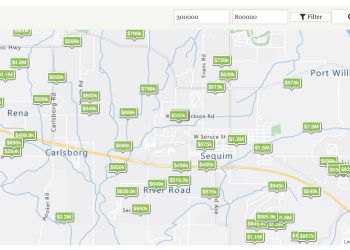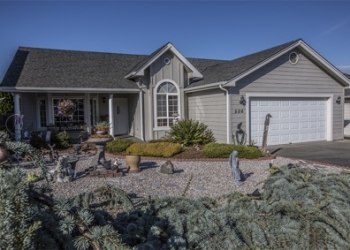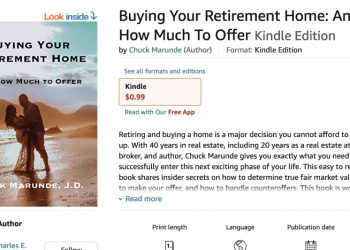 Question: I found your website doing a search for “for sale by owner” information. I am considering the pros and cons of listing this myself, or enlisting a broker to help me out. I am impressed by the amount of information you provide for free.
Question: I found your website doing a search for “for sale by owner” information. I am considering the pros and cons of listing this myself, or enlisting a broker to help me out. I am impressed by the amount of information you provide for free.
Although my property is in Kitsap County, I am writing to ask your advice regarding setting a price that is well above the current market value. The reasons I am considering this are:
1. I am in no hurry for a sale. If it takes the market improving to the point that my asking price is more obtainable, I may be willing to wait for that.
2. Property is 1+ acre in a location that would be perfect for a small business owner. we are on a busy road, and although right now it is zoned residential (the home is manufactured), there are several businesses very nearby. It is only a matter of time before this property is used commercially as well.
Thank you for your time and thank you also for being so generous with the information on your website.
Joe [not real name]
Answer:
One of my pet peeves is overpriced real estate. An overpriced home on the market can actually cost a seller a lot of money. A home only sells for fair market value (FMV), not more than buyers are willing to pay. That’s what FMV is–what a ready, willing, and able buyer is willing to pay for a home. Yet we still see both FSBO’s and agent listings on the market above FMV, and some are substantially above FMV.
If your home is for sale at a price above FMV, you can end up selling it for even less than FMV down the road. I’ve been preaching this for almost 20 years now, but finally there is authoritative proof. [See my earlier blogs on this: Save $10,000 Buying and Port Angeles and Sequim Overpriced Listings]
The proof is in the Sunday, October 28, 2007 issue of the Seattle Times at page E7:
“Real estate agents often warn sellers about the danger of overpricing a house. Now they have evidence to show skeptical clients: research by Jeffrey Otteau, a New Jersey appraiser. He found that in a market where prices are declining, sellers who ‘test the market’ with a high price usually end up with a lower price than those who price realistically.”
The article points out that a house that is priced right for the current market sells within a reasonable time, but one that is overpriced will sit on the market while the market prices decline, and when the home does finally sell, it sells for less than the FMV of that home when it was first on the market.
The statistical proof showed that in a market where a home that was listed for $599,900 (FMV) and which sold for $599,000 (almost full listed price within 30 days), a comparable house that was overpriced at $634,900 actually sold for $585,000 months later when the market had declined even a little more.
There’s another solid reason not to overprice your home. When a home first goes into the MLS and is advertised at that price, you have an opportunity to reach a small percentage of buyers who may be interested in your home, can actually afford it, and who are ready to do so now. An overpriced home may cause them to look elsewhere. And this is the clincher, buyers rarely come back to look at the same home again even after you’ve reduced the price. That’s true. Not only will most buyers not come back to see if you’ve reduced the price in the months to follow, but by the time you actually do reduce the price in the MLS, those original buyers are long gone, most having purchased a home that was not overpriced. So as a practical matter, you have one shot at each buyer.
Sometimes a seller who wants to gamble by asking far more than his home is worth will say, “I’m in no hurry to sell. If it doesn’t sell, I can hang on to it until prices go back up.” If that’s your sentiment, then don’t waste time and effort listing it for sale when you know it won’t sell. Hoping you will get lucky and find an uninformed buyer who will pay way more for your property than the true FMV is a pipe dream. Buyers are very intelligent these days, especially with the availability of the powerful tools on the Internet. If you want more, then don’t list your home until prices actually do appreciate to that level. Believe me, no one will buy an overpriced home.
This is such an important lesson for homeowners who want to “test the market” with an excessively high price. Don’t do it. You could lose a lot of money by the time you end up selling it for much less in a slower market.
Last Updated on July 27, 2012 by Chuck Marunde































There is a variety of FSBO choices on the internet. Some seem to think MLS listing is the correct way to go, but I think that is an old way to sell a home. In fact, I can no longer see a use for expensive MLS listings or realtors this day-in-age. Most buyers look on the internet first before ever even contacting a realty company. When and if they DO contact a realtor, they use the internet. So why not cut out the expenses and middle men and list on inexpensive or free websites? Just my two cents.
Hope this helps people!